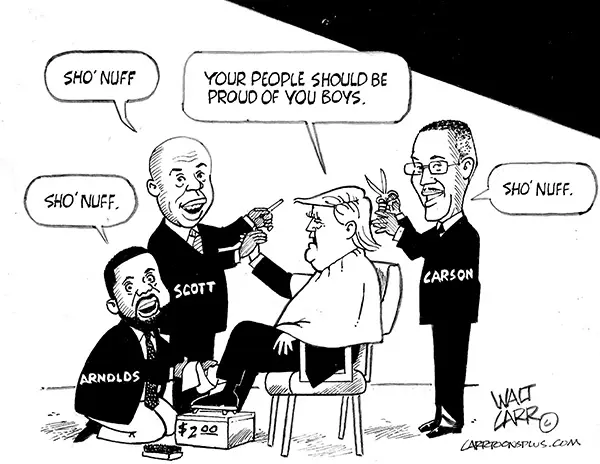Slim Majority of All Polled Frown on Anti-DEI Efforts
Some Say It’s Time for a Black Pope
‘Journal-isms’ Author to Join SPJ – D.C. Hall of Fame
The Moment Sewell Chan’s Fate Was Sealed
Sharpe on Leave From ESPN After Rape Accusation
White House Correspondents Showcase Diversity
. . . Series on Prisons’ ‘Captive Workforce’ a Winner
Home-State Paper Misses the Rubio With Scruples
Store Finds Way Around Academy’s Ban on Books
PBS Revisits Haitians, Racism in Springfield, Ohio
Short Takes: Sudan enters Year 3 of civil war; Society of Environmental Journalists meets; folding of Houston Landing; Carole Simpson, Howard W. French, Isabel Wilkerson, Peggy Berryhill and Duncan McCue; an AI response to L.A. Times opinion pieces; Paul Cheung; report on world’s indigenous media; George Cheeks and Sheryl Lee Ralph; “Latino USA”; France apologizes to Madagascar; racial makeup of U.K. media; persecution of Cuba’s independent journalists; Trinidad and Tobago.
Homepage cartoon credit: Walt Carr
Support Journal-ismsDonations are tax-deductible
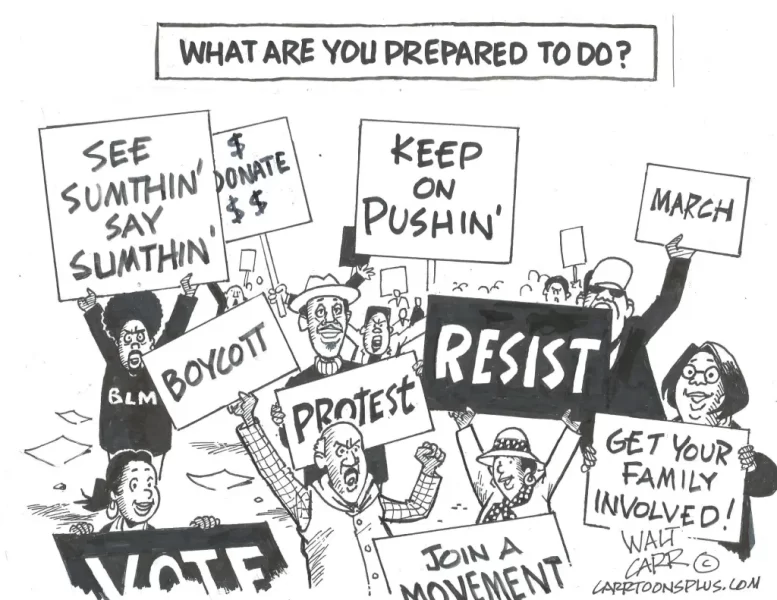
(Credit: Walt Carr/Carrtoons)
Slim Majority of All Polled Frown on Anti-DEI Efforts
Eighty-two percent of Black adults polled by the Pew Research Center strongly disapprove of the job Donald Trump is doing as president, the largest of any racial or ethnic group in the survey. Only 14 percent approved.
(Credit: WUSA-TV, Washington, D.C.)
That news came shortly before many became outraged at yet another perceived blow by the administration: Reports circulated that at the Smithsonian Institution, “Trump officials are sending back exhibit items to their rightful owners and dismantling them — starting with the 1960 Woolworth’s lunch counter sit-in exhibit,” as April Ryan wrote for BlackPressUSA. Ryan later reported that Smithsonian officials said the lunch-counter exhibit would stay. Officials said the terms for housing a historic Bible had expired, a local television station reported.
For Hispanics, the Pew survey found, 72 percent disapproved of Trump’s performance, compared with 27 percent approving; for Asians 69 percent disapproved vs. 29 percent approved.
In a related finding, “A narrow majority of the public (53%) disapproves of the Trump administration’s actions to end diversity, equity and inclusion (DEI) policies in the federal government, while 44% approve of these actions.
“Nearly eight-in-ten Republicans (78%) approve of the efforts to end DEI practices in government, while 86% of Democrats disapprove.”
Among whites, the racial group that a previous Pew survey showed were expected to gain influence under Trump, the verdict was nearly evenly split as his 100-day mark neared: 51 percent disapproved and 49 percent approved.
The survey did not include Indigenous Americans, though news organizations reporting on that group have consistently run stories on the negative impact the Trump administration is having there. “Tribal leaders sound alarm as Trump’s federal cuts threaten Indigenous communities,” reads one headline in ICT News, formerly Indian Country Today. “Native nations are concerned that Trump’s cuts have the potential to violate trust responsibilities,” says another.
Pew’s survey, conducted April 7-13 and released Wednesday, showed that “Today, 40% of U.S. adults approve of the way Trump is handling his job as president, including 31% who strongly approve. Nearly six-in-ten disapprove, including 48% who do so strongly,” the center reported.
“Ratings among Asian Americans have fallen more sharply than those of most other groups: While nearly half of Asian adults approved of Trump in February (47%), that share has dropped to 29% today. (Estimates for Asian adults are representative of English speakers only.)”
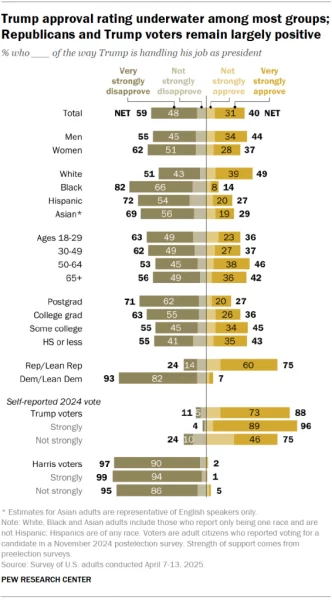
Overall, “Trump does not currently draw confidence from a majority of Americans for his handling of any major issue, while his rating on the economy is at its lowest point in surveys dating back to 2019.
“More Americans say that, compared with the Biden administration, the Trump administration’s policies have made the U.S. economy weaker (49%) rather than stronger (37%). Another 13% say there is not much difference.”
Trump’s tariff policies were another dividing line.
“White adults are closely divided on the administration’s tariff actions, with 53% disapproving and 46% approving,” Pew found.
“By contrast, 79% of Black adults disapprove of the tariff increases, as do 70% of Asian adults and 66% of Hispanic adults,” the survey found.
By and large, however, the survey did not list reasons for the racial and ethnic groups’ stances toward Trump. But others have.
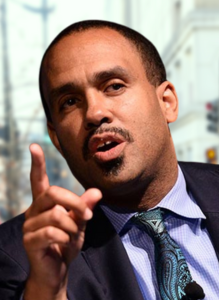 Dedrick Asante-Muhammad, president of the Joint Center for Political and Economic Studies, the leading Black think tank, wrote April 15, “When Donald Trump took office in 2017, many in the civil rights community recognized the contours of a familiar backlash. Like [former President Ronald] Reagan, Trump used racially coded language to stoke division. He targeted affirmative action and diversity programs, undermined civil rights enforcement, and rolled back protections for marginalized communities. His administration’s early actions sent a clear message: progress would not go unchallenged.
Dedrick Asante-Muhammad, president of the Joint Center for Political and Economic Studies, the leading Black think tank, wrote April 15, “When Donald Trump took office in 2017, many in the civil rights community recognized the contours of a familiar backlash. Like [former President Ronald] Reagan, Trump used racially coded language to stoke division. He targeted affirmative action and diversity programs, undermined civil rights enforcement, and rolled back protections for marginalized communities. His administration’s early actions sent a clear message: progress would not go unchallenged.
“And yet, as before, we resisted.
“The attacks on Diversity, Equity, and Inclusion (DEI) programs we’ve seen in recent years mirror the legal and ideological assaults of the 1980s. Then, as now, the fight is not just about programs — it’s about narratives. Reagan popularized the myth of the ‘welfare queen’; Trump leaned into the lie of ‘reverse racism.’ Both administrations used these distortions to justify policy shifts that harm Black and brown communities while consolidating power among the privileged.
“But there’s a lesson here, too: the periods of greatest resistance often precede moments of transformation. . . .”
There are continuing cautions that Latinos are not a monolith, yet María Teresa Kumar, president of voting rights group Voto Latino and a former Democratic congressional aide, said with confidence this month on MSNBC after 10 days of focus groups: “This is not what folks voted for. For folks in the Latino community that said … ‘I’m gonna vote for Trump this time,’ it was all to help fix their economic situation. And this is the absolute opposite.”
Among Asian Americans, a poll from the Associated Press-NORC Center for Public Affairs Research released April 9 showed that “AAPI adults are opposed to federal cuts to diversity and equity programs. Two-thirds oppose eliminating initiatives that seek to broaden access to federal resources, policies, and programs for Asian Americans and Pacific Islanders, and that eliminate federal funding to K-12 schools that teach about the ongoing impact of slavery and racism in America.
In addition, “Only a quarter of AAPI adults support eliminating birthright citizenship for children born in the United States to parents who are here on a temporary work or student visa (24%), while about half oppose (56%). Similarly, about a third of AAPI adults support eliminating birthright citizenship for children born to immigrants who are here illegally (32%), while 50% oppose. On the matter of legal immigration, half oppose reducing the number of family-sponsored visas available for immigrants living in the country legally to bring their relatives to the United States or reducing the number of temporary work visas, such as H-1B visas, available for foreign workers.”
“The world mourns the death of Pope Francis and reflects on his words and actions. How will he be remembered in Africa?” asked German broadcaster Deutsche Welle. “From a continent Francis embraced warmly, we hear from Africans themselves on what his papacy meant to them. And we take a look at three potential options if the Catholic Church were to elect an African pope.” (Credit: YouTube)
Some Say It’s Time for a Black Pope
“IS GOD still racist?” asked Dotun Adebayo Wednesday in the Voice, Britain’s most prominent Black newspaper.
“Try as I might, I couldn’t see Him as a Black man. Could you?
“Maybe it’s the way we were raised, particularly those of us who grew up in the Church. Maybe it’s why I still struggle to see Him as a woman, or a hunchback. Or a Chinese man. Or trans. Or even Morgan Freeman.
“Even when Hollywood gives us God in Blackface, like Freeman in the movie Bruce Almighty, it’s comedy. . . .”
 Despite the improbability some see, others argue that the time is right for a Black pope. For one thing, said Jude Dike (pictured), writing in Nigeria’s Punch, “While Europe and the Americas once held the majority of the world’s Catholic population, Africa has experienced explosive growth in both the number of Catholics and the number of seminaries and clergy emerging from the continent.
Despite the improbability some see, others argue that the time is right for a Black pope. For one thing, said Jude Dike (pictured), writing in Nigeria’s Punch, “While Europe and the Americas once held the majority of the world’s Catholic population, Africa has experienced explosive growth in both the number of Catholics and the number of seminaries and clergy emerging from the continent.
“In fact, Sub-Saharan Africa now accounts for over 20 per cent of the global Catholic population, with numbers steadily increasing. According to the Vatican’s 2022 Statistical Yearbook, the number of Catholics in Africa has more than doubled in the past 50 years, a trend that continues to accelerate.
“Yet, despite the rise of Africa’s Catholic presence, the Vatican remains overwhelmingly European, with only a handful of African cardinals, the electors of the next pope, making their mark on the highest echelons of Church leadership.”
 In the Philadelphia Inquirer, Jenice Armstrong (pictured) told readers Friday, “There would be no better way for the church to demonstrate its commitment to racial inclusivity than by naming a Black pope. It would make a profound statement — not just in the United States, where President Donald Trump has demonized diversity, equity, and inclusion, but around the world.”
In the Philadelphia Inquirer, Jenice Armstrong (pictured) told readers Friday, “There would be no better way for the church to demonstrate its commitment to racial inclusivity than by naming a Black pope. It would make a profound statement — not just in the United States, where President Donald Trump has demonized diversity, equity, and inclusion, but around the world.”
The next pope, observed the Rev. Dorothy S. Boulware in the Black-press consortium Word In Black, will follow one who “gave more attention to Black people than many” of his predecessors, adding, “the church as an institution still has work to do when it comes to race, experts say. . . .
“Two years ago, the church formally repudiated the colonial-era ‘doctrine of discovery’ — official declarations that justified European conquests of Africa and the Americas. Catholic churches were complicit in — and sometimes benefited from — the African slave trade. The church did not stand unified against slavery during the Civil War, and Jim Crow-era segregation in the pews was common.
“Francis, however, issued several declarations and letters to bishops condemning the ‘sin’ of racism, and spoke out after the murder of George Floyd in 2020 . . .”
While the National Catholic Reporter did not list any Black people as front-runners for the job, Nate Tinner-Williams, founder and editor of the U.S.-based Black Catholic Messenger, pointed Wednesday to Cardinal Robert Sarah of Guinea, Cardinal Peter Turkson of Ghana, and 65-year-old Cardinal Fridolin Ambongo Besungu of the Democratic Republic of Congo. The New York Times likewise listed Besungu.
In the Philadelphia Tribune, Sherry Stone added that “Luis Antonio Tagle, 67, of the Philippines, could also become the first Asian pope in history if he wins enough votes from the conclave in May.”
- Jon Allsop, Columbia Journalism Review: The Pope and the press
- Rhina Guidos, National Catholic Reporter: In Latin America, Francis’ supporters share gratitude, resolve to continue his work
- Silvia Higuera, LatAm Journalism Review: Days before Pope Francis’ death, church formally dissolves Peruvian group exposed by journalists
- Sam Metz and Jean-Fernand Koena, Associated Press: Catholics remember Pope Francis as a friend of Africa, with some setting theology aside
‘Journal-isms’ Author to Join SPJ – D.C. Hall of Fame
Richard Prince, author of the “Journal-isms” column and “a lifelong advocate for diversity in newsrooms,” has been chosen for the Hall of Fame of the Washington, D.C., chapter of the Society of Professional Journalists, the chapter announced Thursday.
He joins Michael Abramowitz, “director of the embattled Voice of America, its very existence under threat from the current administration,” and Denise Rolark Barnes, “the publisher of one of Washington’s oldest news organizations serving African Americans.”
(On Tuesday, a federal judge ordered the Trump administration to rehire all Voice of America, Radio Free Asia and Middle East Broadcasting Network staff for now, and he said all congressional funding must resume to the outlets, which had been effectively shuttered by the administration, according to CBS News.)
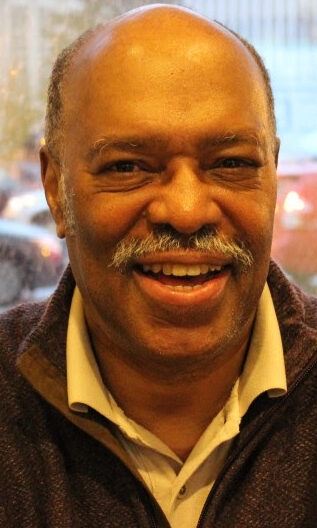 Prince (pictured) “was inducted into the National Association of Black Journalists Hall of Fame in 2019 as a member of the Washington Post Metro Seven, which filed a complaint against the Post in 1972 charging racial discrimination.
Prince (pictured) “was inducted into the National Association of Black Journalists Hall of Fame in 2019 as a member of the Washington Post Metro Seven, which filed a complaint against the Post in 1972 charging racial discrimination.
“In 2013, Prince received the Ida B. Wells Award (video) from the National Association of Black Journalists and the Medill School at Northwestern University, ‘given to an individual who has made outstanding efforts to make newsrooms and news coverage more accurately reflect the diversity of the communities they serve, ‘ ” SPJ noted.
“The honorees will be feted at the DC chapter’s Dateline Awards Dinner Tuesday, June 10 at the National Press Club. Master of Ceremonies for the evening will be Kojo Nnamdi, host of WAMU Radio’s Politics Hour,” the announcement continued.
“At the dinner, SPJ DC also will announce the winners of its 2025 Dateline Awards competition, honoring the best journalism produced in the DMV [District of Columbia, Maryland and Virginia], and will give a Distinguished Service Award to a journalist whose work and actions have made a positive difference on our craft and society.”
“Tickets for the Dateline Dinner will go on sale soon.”
The Moment Sewell Chan’s Fate Was Sealed
 The firing of Sewell Chan (pictured), the executive editor of the Columbia Journalism Review, came after an hourlong meeting Thursday between Jelani Cobb, dean of the journalism school, and the magazine’s editorial staff, Benjamin Mullin reported Wednesday for The New York Times.
The firing of Sewell Chan (pictured), the executive editor of the Columbia Journalism Review, came after an hourlong meeting Thursday between Jelani Cobb, dean of the journalism school, and the magazine’s editorial staff, Benjamin Mullin reported Wednesday for The New York Times.
“During the meeting, roughly 10 people aired concerns about Mr. Chan’s behavior, describing insults, threats to ruin their reputations, and an atmosphere of fear and hostility, according to two people with knowledge of the discussion who spoke on the condition of anonymity. Several participants cried.”
Chan, widely respected in the news industry, has protested that the complaints involved “normal workplace interactions and I did exactly what I was hired to do, which was to provide rigorous, fair, careful editorial oversight and raise the metabolism and impact of a publication that’s supposed to monitor the media.”
However, after the firing became public April 18, Ravi Somaiya, who worked with Chan at Columbia Journalism Review as digital editor and co-founded breaker.com, posted a piece on his site titled, “Inside Sewell Chan’s brief, horrible editorship of the Columbia Journalism Review (from my perspective).” “He seemed to have two modes: rage, at anyone he felt inferior to him, and obsequiousness towards anyone he considered a superior. He seemed incapable of asking even reasonable questions nicely,” Somaiya wrote.
On Tuesday, breaker.com said, it had “received several messages from former colleagues of Chan at the Los Angeles Times and New York Times saying that they had similar experiences of hostility and strange behavior.”
Chan told his former colleagues at the Los Angeles Times, where he was editorial page editor, called breaker.com ” a paywalled gossip startup founded by a former CJR editor who had applied for my job — please consider the source. My LinkedIn comments are filled with people who worked FOR me who described the Sewell they worked with.”
Sharpe on Leave From ESPN After Rape Accusation
“Football great Shannon Sharpe (pictured) said Thursday that he will ‘step aside temporarily’ from his duties at ESPN in the wake of a $50 million lawsuit accusing him of rape,” David K. Li and Lilia Wood reported Thursday for NBC News.
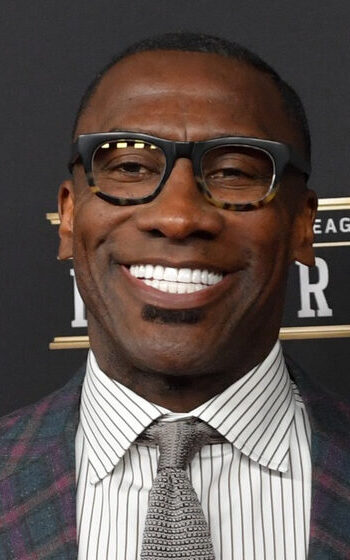 “The 56-year-old former Denver Broncos tight end said he needs time away from the studios to fight allegations that he called ‘false and disruptive.’
“The 56-year-old former Denver Broncos tight end said he needs time away from the studios to fight allegations that he called ‘false and disruptive.’
” ‘At this juncture I am electing to step aside temporarily from my ESPN duties,’ he said in a statement.
“The first NFL exhibition game is set for July 31, with the regular season likely to kick off Thursday, Sept. 4. Sharpe hopes to be back behind the mic by then. . . .
“A woman filed a lawsuit in Nevada on Sunday, accusing Sharpe of raping her twice in Las Vegas in October and one more time in January, according to the suit.
“The woman said she was 19 years old in 2023 when she first met Sharpe in a Los Angeles gym, leading to a ‘rocky consensual relationship’ of nearly two years in which he was frequently ‘aggressive’ and raped her, according to the Clark County civil complaint. . . .
“Since the end of his playing days, Sharpe has had a long career in the studio as a football analyst for CBS, Fox Sports and ESPN.”
- Victoria Uwumarogie, Essence: Op-Ed: Shannon Sharpe’s Toxic Masculinity Could Cost Him Everything
- Alex Weprin, Hollywood Reporter: Stephen A. Smith Speaks Out on Shannon Sharpe After His ‘First Take’ Absence Amid Rape Lawsuit
White House Correspondents’ Association President Eugene Daniels: “We journalists are a lot of things. We are competitive and pushy. We are impatient and sometimes we think we know everything. But we are also human, we miss our families and significant life moments in service to this job. We care deeply about accuracy and take seriously the heavy responsibility of being stewards of the public’s trust. What we are not is the opposition. What we are not is the enemy of people. What we are not is the enemy of the state.” (Credit: C-SPAN/YouTube)
White House Correspondents Showcase Diversity
Some of the first reviews of Saturday’s White House Correspondents’ Dinner — lacking an appearance by President Trump or a comedian who was hired, then fired — called it a failure.
But the event, held before about 2,500 people at the Washington Hilton and televised live, did showcase Black journalists in ways not often seen.
And it ended with a forthright statement by Eugene Daniels, only the second Black president of the 111-year-old association, on why journalists practice their profession in the first place.
“The invitations to presidents, Daniels said from the stage on Saturday, are not to cozy up to power or curry favor,” Roxanne Roberts reported for the Washington Post. “ ‘We invite them to demonstrate that those of us who have chosen the public service of journalism aren’t doing it because we love flights on Air Force One or walking into the Oval Office. It’s to remind them why a strong Fourth Estate is essential for democracy. Why, at the end of the day, it’s good for them.’ Then he played a video of past presidents at the dinner extolling the importance of a free press. It was a subtle rebuke — okay, not that subtle — to Trump and his attacks on the media.
“The evening ended with a toast to the First Amendment and the journalists who defend it.”
April Ryan, Washington bureau chief and White House correspondent for Black Press USA, recalled that she had publicly criticized Daniels over his leadership, but Saturday night, she told Journal-isms, “he was super forceful. I was proud of Eugene.”
Daniels presided over a video segment honoring Bob Ellison, the first Black president of the association, mentioned publisher and activist icon Ida B. Wells, introduced Black journalists Abby Phillip of CNN and Kristin Welker of NBC News as awards segment presenters, and told attendees and viewers of Ryan’s achievement as now the nation’s longest serving Black White House correspondent.
Daniels, newly named MSNBC co-host, noted that his successor in the association presidency, Weija Jang of CBS News, an Asian American, would be the first woman of color to lead the association.
In addition, the group announced that it is creating a new scholarship grant that will award $5,000 to a student at the Scripps Howard School of Journalism and Communications at historically Black Hampton University in Hampton, Va.
It wasn’t visible to viewers or the audience, but each of the judging panels for the four awards included a Black journalist.
If there was hard news at the event, it was when Axios reporter Alex Thompson, receiving the Aldo Beckman Award for Overall Excellence in White House Coverage, recalled the 2024 presidential election and said: “President Biden’s decline, and its cover-up by the people around him is a reminder that every White House regardless of party is capable of deception.”
Thompson continued: “Being truth tellers also means telling the truth about ourselves. We, myself included, missed a lot of this story. And some people trust us less because of it. We bear some responsible for faith in the media at such lows.”
. . . Series on Prisons’ ‘Captive Workforce’ a Winner
“This year’s winner of the $25,000 Collier Prize for State Government Accountability is The Associated Press for its series, ‘Prison to Plate: Profiting off America’s Captive Workforce, ‘ ” the prize administrators announced Thursday. The award was presented Saturday at the White House Correspondents’ Dinner.
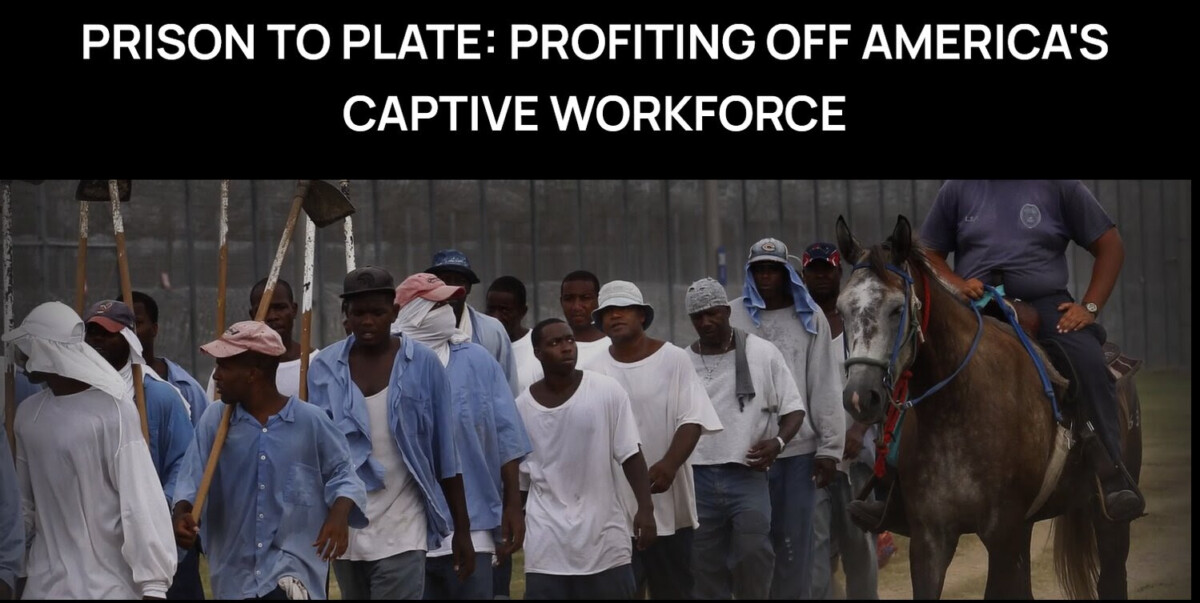 “In their project, AP reporters Margie Mason and Robin McDowell exposed how deeply our supply chain relies on prison labor as well as the deplorable working conditions of the imprisoned workers,” an announcement said.
“In their project, AP reporters Margie Mason and Robin McDowell exposed how deeply our supply chain relies on prison labor as well as the deplorable working conditions of the imprisoned workers,” an announcement said.
“During a two-year investigation, Mason and McDowell filed public records requests in all 50 states, and spoke with more than 120 current and former prisoners, as well as relatives of those killed on the job. They found that many workers were given dangerous positions, from laboring in poultry plants to fighting wildfires.
“They learned that products produced by prison labor were sold to consumers by some of the most recognizable brands in America — appearing on store shelves and restaurant plates across the country.
“If these products had been the result of captive labor outside the United States, U.S. law would have banned their importation. The reporting also showed a link from slavery to today, with predominantly black prisoners in Louisiana picking crops on prison land that was a plantation before the Civil War.
“The impact of their reporting was almost immediate. . . .”
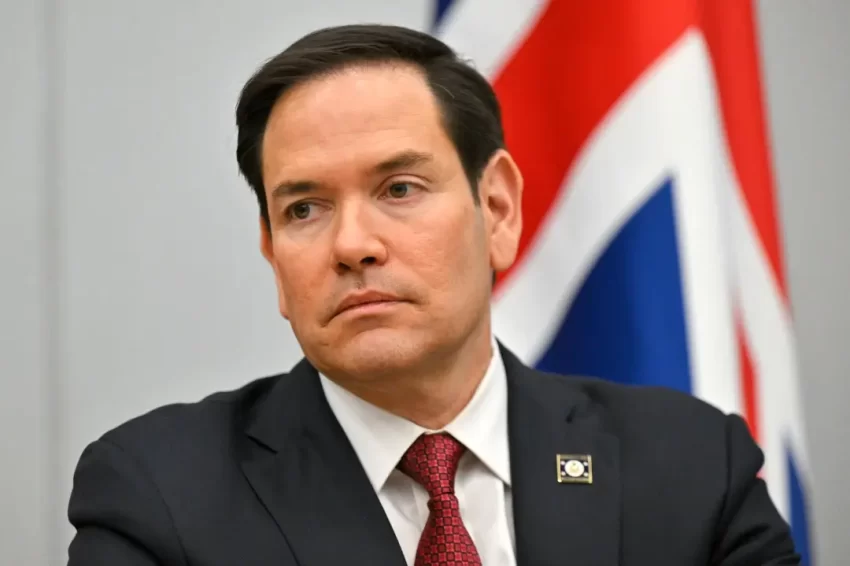
U.S. Secretary of State Marco Rubio during a meeting on the sidelines of the NATO foreign ministers at NATO headquarters in Brussels on April 4. (Credit: Nicolas Tucat/Pool)
Home-State Paper Misses the Rubio With Scruples
“Pedro Victor Garcia would not have survived 72 hours in today’s America — the one being transformed by his grandson,” the Sun-Sentinel in Fort Lauderdale, Fla., editorialized Wednesday.
“Garcia fled his Cuba homeland for the U.S. with a leg injury, scoliosis, polio and no visa. Immigration officials ordered Garcia deported, but relented.
“As a U.S. Senate candidate, Marco Rubio liked to talk up his grandfather’s inspiring journey. But as Donald Trump’s secretary of state, Rubio is determined to make sure that future Pedro Victor Garcias are sent back where they came from.
“In less than 100 days, Rubio has approved sending political refugees back into the arms of one brutal dictator. He applauded a policy of sending Americans to the foreign prisons of another. He has taken up the cause of Vladimir Putin, who he previously denounced, in undercutting Ukraine, which he previously protected.
“Bad for Florida
“ He has not publicly spoken out against Donald Trump’s plan to deport Cubans.
He has not publicly spoken out against Donald Trump’s plan to deport Cubans.
“In short, Rubio’s scruples have left the building. He’s hardly the first to decry and then embrace the president. That well-worn path is paved by critics-turned-toadies who called Trump a ‘race-baiting xenophobic bigot’ (Sen. Lindsey Graham), ‘utterly amoral’ (Sen. Ted Cruz) and ‘America’s Hitler’ (Vice President JD Vance).
“But Rubio’s transformation is uniquely harmful to Florida.
“As secretary of state, he has abandoned his state’s immigrants. By embracing toxic immigration policies, he sets the stage for an economic downturn certain to harm tourism-dependent Florida.
“Goldman Sachs estimates the cost of stiff tariffs, combined with lost tourism, could reach $90 billion.
Strip-searched and shackled
“Visitors must weigh the risks of vacation trips against reports of the British backpacker thrown into detention for three weeks; the Australian martial arts coach strip-searched and detained over a paperwork error; the German man shackled and detained for weeks, apparently after incorrectly answering a question; and the German teenage girls strip-searched, jailed and deported at the end of their graduation trip in Hawaii.
“Rubio’s response to tourists is to stay away. Visiting America is a privilege, he scolded, and not “behaving appropriately” is grounds for expulsion.
“In fact, just thinking inappropriately might get you pulled off the street. In a two-page memo justifying the snatching of a legal U.S. resident, Rubio cited ‘past, current, or expected beliefs’ as one of the justifications for doing so if he believed their behavior ran afoul of Trump’s America First policy.
“The Marco Rubio who was among the U.S. Senate’s most vocal critics of authoritarianism would have been appalled.
“But that man has disappeared. . . . “
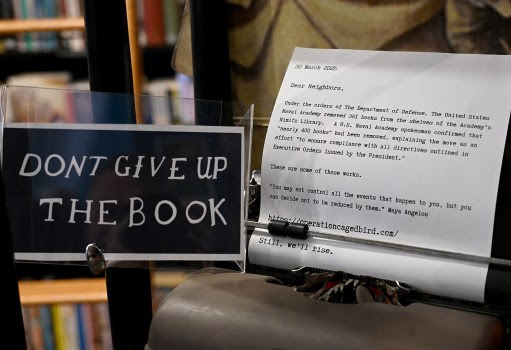
Old Fox Books on Maryland Avenue in Annapolis, Md., has created a display and “Operation Caged Bird” to make the 381 books banned at USNA more available to midshipmen. (Credit: Jeffrey F. Bill/Baltimore Sun)
Store Finds Way Around Academy’s Ban on Books
A retired Navy commander and his favorite Annapolis bookstore are working to give Naval Academy midshipmen access to other copies of many of the 381 books recently removed from the academy’s library, James Matheson reported April 21 for the Baltimore Sun.
As reported in this space this month, “such prominent Black journalists and commentators as Juan Williams, Wil Haygood, Michael Eric Dyson, Bakari Sellers, Eddie Glaude, Wesley Lowery and the late Greg Tate are among the authors on a list released by the U.S. Naval Academy of 381 books and literary works removed from its library as part of a review of diversity, equity and inclusion materials.”
Matheson continued, “William Marks, a 1996 Naval Academy graduate, worked as director of university communications from 2011 to 2013. From his post inside Larson Hall, Marks said he frequently made the less than a quarter mile walk through the turnstile at Gate 3, along the red bricks of Maryland Avenue and into Old Fox Books.
“So when Marks launched a fundraiser earlier this month to purchase and make available many of the removed books, Old Fox Books was the first place he called. The Washington Post reported on the fundraiser previously.
“That call led to Operation Caged Bird, a reference to Maya Angelou’s autobiography, ‘I Know Why the Caged Bird Sings.’ The book, one of the high-profile titles on the removed-books list, details the racial abuse Angelou encountered throughout her early life.
“ ‘My wish is to not only make sure midshipmen have access to these books, it’s to inspire people,’ Marks said. ‘People need to know there is a resistance, there are those who oppose book bans and there are those who oppose overreach by the executive branch.’
“The Naval Academy earlier this month released a list of 381 books that were removed from its Nimitz Library after a directive from Defense Secretary Pete Hegseth’s office to evaluate and eliminate works focused on diversity, equity and inclusion. . . .”
- Perry Bacon Jr., Washington Post: Polls aren’t going to save us from Trump
- Ginia Bellafante, New York Times: He’s a Foe of D.E.I. in Schools but Not a Fan of Trump’s Crusade
- Jamelle Bouie, New York Times: One Way to Keep Trump’s Authoritarian Fantasy From Becoming Our Reality
- Stacy M. Brown, Black Press USA: Civil Rights Groups to White House: ‘We Won’t Back Down
- Adrian Carrasquillo, the Bulwark: 100 Days In, Mass Deportation Is a Failure
- Chicago Sun-Times: New to Chicago? Here are resources for immigrants, asylum-seekers and more
- Liz Courquet-Lesaulnier, World In Black: Most Black folks owe the most and default the most. Now the Trump administration plans to garnish the wages of folks who stopped paying.
- Tom Davidson, Editor & Publisher Magazine: Losing public funding won’t kill public media: Ignoring the audience problem will
- J. David Goodman, Audra D. S. Burch, Clyde McGrady, Ruth Graham, Katie Benner and Elizabeth Dias, New York Times: What 11 Black Voters Think About Trump’s Actions in His First Month (Feb. 20)
- Courtney Griffin, New York Amsterdam News: Amid military DEI backlash, Black veterans slam the Department of Defense’s erasure of identity months. (April 3)
- Phenix S Halley, The Root: A List of HBCU Endowments vs. Harvard’s: The Real Reason Why Harvard Can Sue Trump and Black Colleges Won’t
- Roy S. Johnson, al.com: 30 years after Oklahoma City bombing terror, Trump callously terrorizes federal workers (April 19)
- Ruben Navarrette, Creators Syndicate: 15 Truths About Immigration, Some More Uncomfortable Than Others
- Marc Levy, Associated Press: US Justice Department drops lawsuit accusing Pennsylvania city of diluting power of Hispanic voters
- Adam Monroe Jr., GW Hatchet, George Washington University: Journalists discuss future of newsroom diversity initiatives
- Clarence Page, Chicago Tribune: Trump immigration crackdown enters the Twilight Zone
- Haniyah Philogene, theGrio: A plantation museum spotlighting the truths of slavery has lost federal grants in ‘furtherance of the president’s agenda’
- Holly Ramer, Associated Press: 19 states sue Trump administration over push to end diversity programs in public schools
- Teddy Rosenbluth and Rebecca Robbins, New York Times: Trump-Allied Prosecutor Sends Letters to Medical Journals Alleging Bias
- Reporters Committee for Freedom of the Press: Covering immigration? RCFP’s new legal guide can help.
- April Ryan, Black Press USA: Trump’s Signs New HBCU Executive Order
- Carmen Sesin, NBC News: Florida college students scared, on edge over campus police’s cooperation with ICE
- Clint Smith, the Atlantic: What It Means to Tell the Truth About America
- Peter Smith, Associated Press: Black churches back embattled Smithsonian African American history museum after Trump’s order
- Akemi Tamanaha, AsAmNews: AAPI adults believe anti-Asian hate will increase, report finds
- Sara Weissman, Inside Higher Ed: After Federal Grant Losses, HBCUs Put Hope in Executive Order
- Erik Wemple, Washington Post: Heard the resistance was dead? You’ve been reading too much. (April 18)
- Randall Yip, AsAmNews: AAPI groups react after Trump student visa revocations reversed
(Credit: PBS/YouTube)
PBS Revisits Haitians, Racism in Springfield, Ohio
“During the campaign, Springfield, Ohio, became a flashpoint in the national conversation when Donald Trump and JD Vance amplified false rumors that Haitian immigrants were abducting and eating pets,” Geoff Bennett told “PBS News Hour” viewers on Wednesday. “Months later, Springfield is reckoning with its turn in the spotlight as its Haitian migrants face the threat of deportation. Judy Woodruff visited the town for her series, ‘America at a Crossroads.’ “
Short Takes
- The civil war in Sudan, designated by the United Nations as one of worst humanitarian crises of the 21st century, is entering its third year. In Columbia Journalism Review, Bill Grueskin recommended a “riveting New York Times package about the famine . . . The US used to provide hundreds of millions of dollars in food, but that spigot of aid has been interrupted while Secretary of State Marco Rubio says he seeks to ferret out waste. In Khartoum, Sudan’s capital, reporter Declan Walsh and photographer Ivor Prickett went to five soup kitchens, even as more than three hundred other kitchens in Sudan have closed. With children dying and Sudan’s citizens ”resorting to eating leaves and grass,’ Walsh and Prickett bring you face to face with the human toll of [Elon] Musk’s and Rubio’s cutbacks.”
- Al Jazeera, meanwhile, asked its correspondent Hiba Morgan (in video, above) how covering the war had affected her. She said, “There are times where, you know, you always think, it’s just a job, that this is something we have to do because we have to . . . and you don’t try to take it personally. . . . . But at the end of the day, it gets to you. . . . It has had its ups and downs; there are moments where, you know, we celebrated personal victories, we celebrated little wins on a personal level, but the negative I would say has been much much more. . . .”
 “Arizona is the ideal place for The Society of Environmental Journalists to spend this week exploring the majestic and climate-challenged place we call home,” Greg Burton (pictured), executive editor of the Arizona Republic, wrote Friday, welcoming SEJ’s annual convention. “We need a world of journalists to understand how 22 tribal nations, seven and a half million people, 10 national parks and monuments and the nation’s fifth-largest city coexist with limited water and unbridled heat.” Burton also wrote, “this year, we are running a student newsroom for SEJ’s annual conference. For three days, 16 students are covering panel discussions, speeches and tours of the state’s border, tribal lands, forests and infrastructure for water and energy. Helping to make it happen are our partners at ASU’s Cronkite School, SEJ, the University of Arizona and grants from the Pulliam Trust and the Arizona Media Association’s Local News Foundation.” The Uproot Project,”a network with a mission to bring diverse voices to the forefront of environmental and climate journalism,” planned a Saturday session, “Charting Our True North: Building Community With/For Journalists of Color.”
“Arizona is the ideal place for The Society of Environmental Journalists to spend this week exploring the majestic and climate-challenged place we call home,” Greg Burton (pictured), executive editor of the Arizona Republic, wrote Friday, welcoming SEJ’s annual convention. “We need a world of journalists to understand how 22 tribal nations, seven and a half million people, 10 national parks and monuments and the nation’s fifth-largest city coexist with limited water and unbridled heat.” Burton also wrote, “this year, we are running a student newsroom for SEJ’s annual conference. For three days, 16 students are covering panel discussions, speeches and tours of the state’s border, tribal lands, forests and infrastructure for water and energy. Helping to make it happen are our partners at ASU’s Cronkite School, SEJ, the University of Arizona and grants from the Pulliam Trust and the Arizona Media Association’s Local News Foundation.” The Uproot Project,”a network with a mission to bring diverse voices to the forefront of environmental and climate journalism,” planned a Saturday session, “Charting Our True North: Building Community With/For Journalists of Color.”
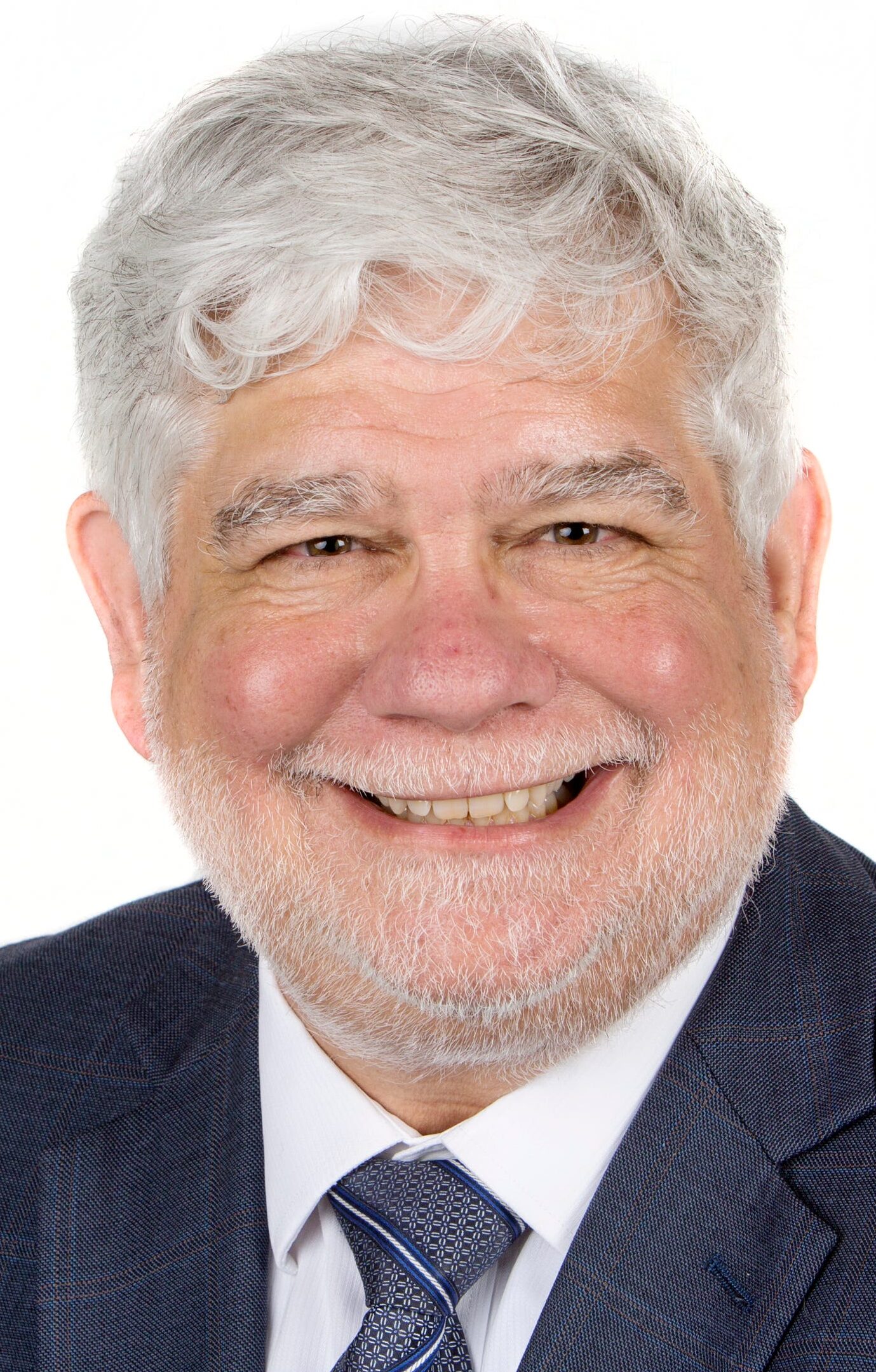 “The Houston Landing, a newsroom that launched two years ago with $20 million in philanthropic commitments, announced today that it will shut down in mid-May and lay off all forty-three employees,” Sewell Chan wrote April 15 for the Columbia Journalism Review. “The decision, which was made by the board of the Landing, represents a costly and prominent — but, so far, rare — failure of a local news startup after the launch of scores of such ventures across the country as local newspapers have shrunk or folded. . . . in the end, the gap between board and staff, between management and labor, and between runway and revenue was just too large to bridge.” CEO Peter Bhatia (pictured) notified readers of the decision.
“The Houston Landing, a newsroom that launched two years ago with $20 million in philanthropic commitments, announced today that it will shut down in mid-May and lay off all forty-three employees,” Sewell Chan wrote April 15 for the Columbia Journalism Review. “The decision, which was made by the board of the Landing, represents a costly and prominent — but, so far, rare — failure of a local news startup after the launch of scores of such ventures across the country as local newspapers have shrunk or folded. . . . in the end, the gap between board and staff, between management and labor, and between runway and revenue was just too large to bridge.” CEO Peter Bhatia (pictured) notified readers of the decision.
 Retired ABC News anchor Carole Simpson; Howard W. French (pictured), author and Columbia University journalism professor; author Isabel Wilkerson; Peggy Berryhill, president of the Native Media Resource Center and Canadian journalist Duncan McCue, a member of the Anishinaabe group of culturally related Indigenous peoples in the Great Lakes region of Canada and the United States, are among the nearly 250 people elected to the American Academy of Arts and Sciences. The academy is one of the oldest honorary societies in the United States. Others chosen from the “Journalism, Media, and Communications” field include Joan BIskupic of CNN, Christine Brennan of USA Today, Anderson Cooper of CNN, and feminist Gloria Steinem.
Retired ABC News anchor Carole Simpson; Howard W. French (pictured), author and Columbia University journalism professor; author Isabel Wilkerson; Peggy Berryhill, president of the Native Media Resource Center and Canadian journalist Duncan McCue, a member of the Anishinaabe group of culturally related Indigenous peoples in the Great Lakes region of Canada and the United States, are among the nearly 250 people elected to the American Academy of Arts and Sciences. The academy is one of the oldest honorary societies in the United States. Others chosen from the “Journalism, Media, and Communications” field include Joan BIskupic of CNN, Christine Brennan of USA Today, Anderson Cooper of CNN, and feminist Gloria Steinem.
- Online readers of the Los Angeles Times opinion pages now have the option to click on a button labeled “Insights” that judges the political opinion of the piece and “offers an AI-generated synopsis — a CliffsNotes version of the column — and a similarly-produced opposing viewpoint,” David Bauder reported April 16 for the Associated Press. “The feature symbolizes changes to opinion coverage ordered over the past six months by Times owner Dr. Patrick Soon-Shiong, who’s said he wants the famously liberal opinion pages to reflect different points of view. Critics accuse him of trying to curry favor with President Donald Trump.“
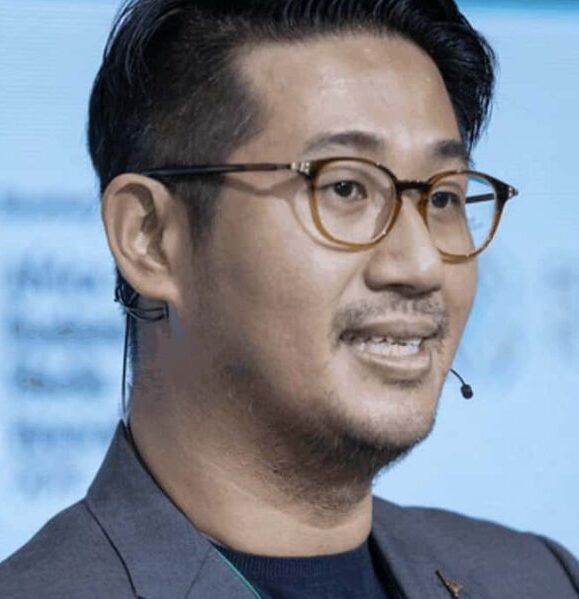 Paul Cheung (pictured), who has spent more than 25 years of expertise in media, technology innovation, philanthropy and nonprofit leadership, most recently at the now-defunct Center for Public Integrity, has been named president of the Committee of 100, a nonprofit organization of prominent Chinese Americans, effective May 31, 2025, the organization announced Wednesday.
Paul Cheung (pictured), who has spent more than 25 years of expertise in media, technology innovation, philanthropy and nonprofit leadership, most recently at the now-defunct Center for Public Integrity, has been named president of the Committee of 100, a nonprofit organization of prominent Chinese Americans, effective May 31, 2025, the organization announced Wednesday.
The Indigenous Journalists Association produced an panel discussion during the 24th session of the United Nations Permanent Forum on Indigenous Issues. Moderated by Bryan Pollard, former president of the association and grant operations manager at the Associated Press, panelists discussed the UNESCO “Indigenous Peoples and the Media” report and the United Nations Declaration on the Rights of Indigenous Peoples. Pollard was joined by Kelly Williams (Bundjalung Nation), director, First Nations Strategy, Australian Broadcasting Corp.; Shane Taurima (Rongomaiwahine/Ngāti Kahungunu), CEO, Whakaata Māori; Sunnie Clahchischiligi (Diné) High Country News and the Indigenous Journalists Association; Tristan Ahtone (Kiowa) of Grist and the Indigenous News Alliance. (Credit: IJA/YouTube)
- Seventy-three percent of Indigenous media cite a lack of financial resources, limiting their reach and digital expansion; and 51 percent face challenges that are related to high equipment costs, according to a UNESCO report on “Indigenous Peoples and the Media” that collected responses from 308 Indigenous media organizations across 74 countries and 128 non-Indigenous media outlets in 41 countries. In addition, “20% of Indigenous media report to the tribal or community councils. This could raise considerations regarding their editorial independence, accountability and self-monitoring.”
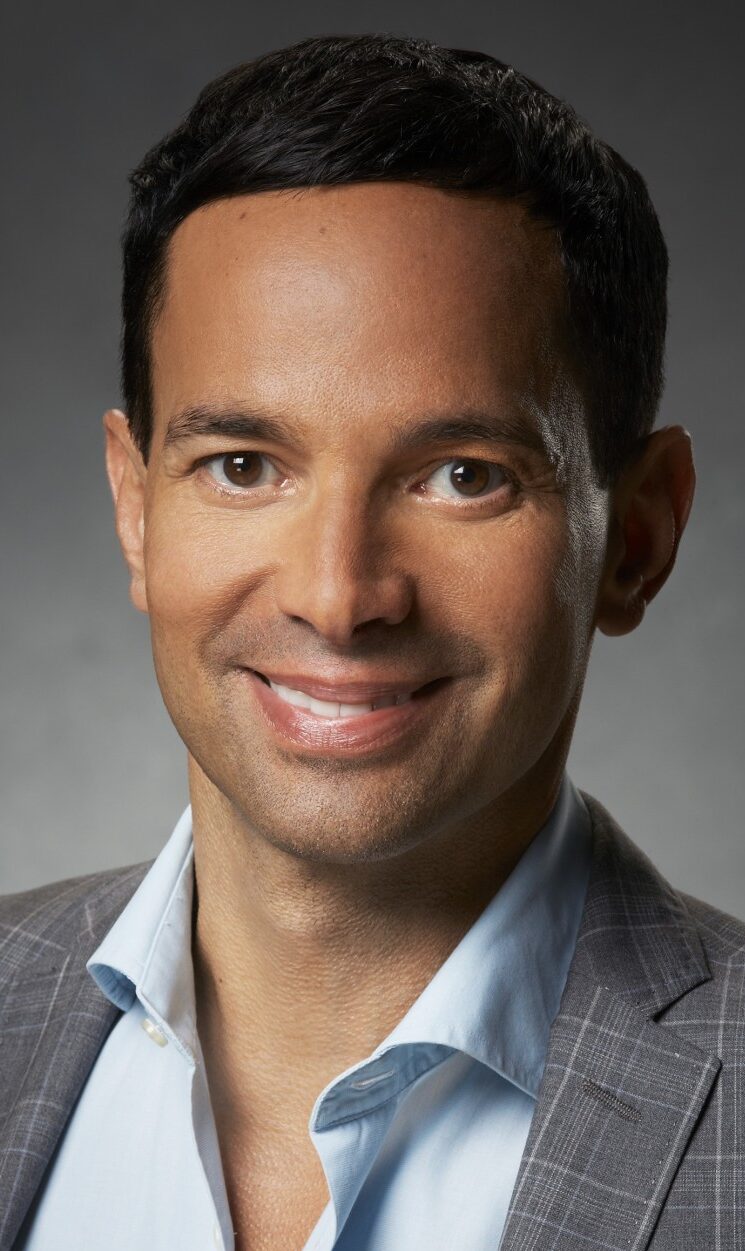 George Cheeks (pictured), co-chief executive officer, Paramount Global; president and chief executive officer, CBS; and Sheryl Lee Ralph, award-winning actress and advocate (Humanitarian Award honoree) are among those selected for the Broadcasting+Cable Hall of Fame, the publication announced Wednesday.
George Cheeks (pictured), co-chief executive officer, Paramount Global; president and chief executive officer, CBS; and Sheryl Lee Ralph, award-winning actress and advocate (Humanitarian Award honoree) are among those selected for the Broadcasting+Cable Hall of Fame, the publication announced Wednesday.
- “The Spillover: How the Texas Abortion Ban Shook Up Eastern New Mexico,” airing as part of “Latino USA,” was selected as the Webby Awards winner in the Podcasts – Health, Wellness & Lifestyle category, Futuro Media announced Thursday.
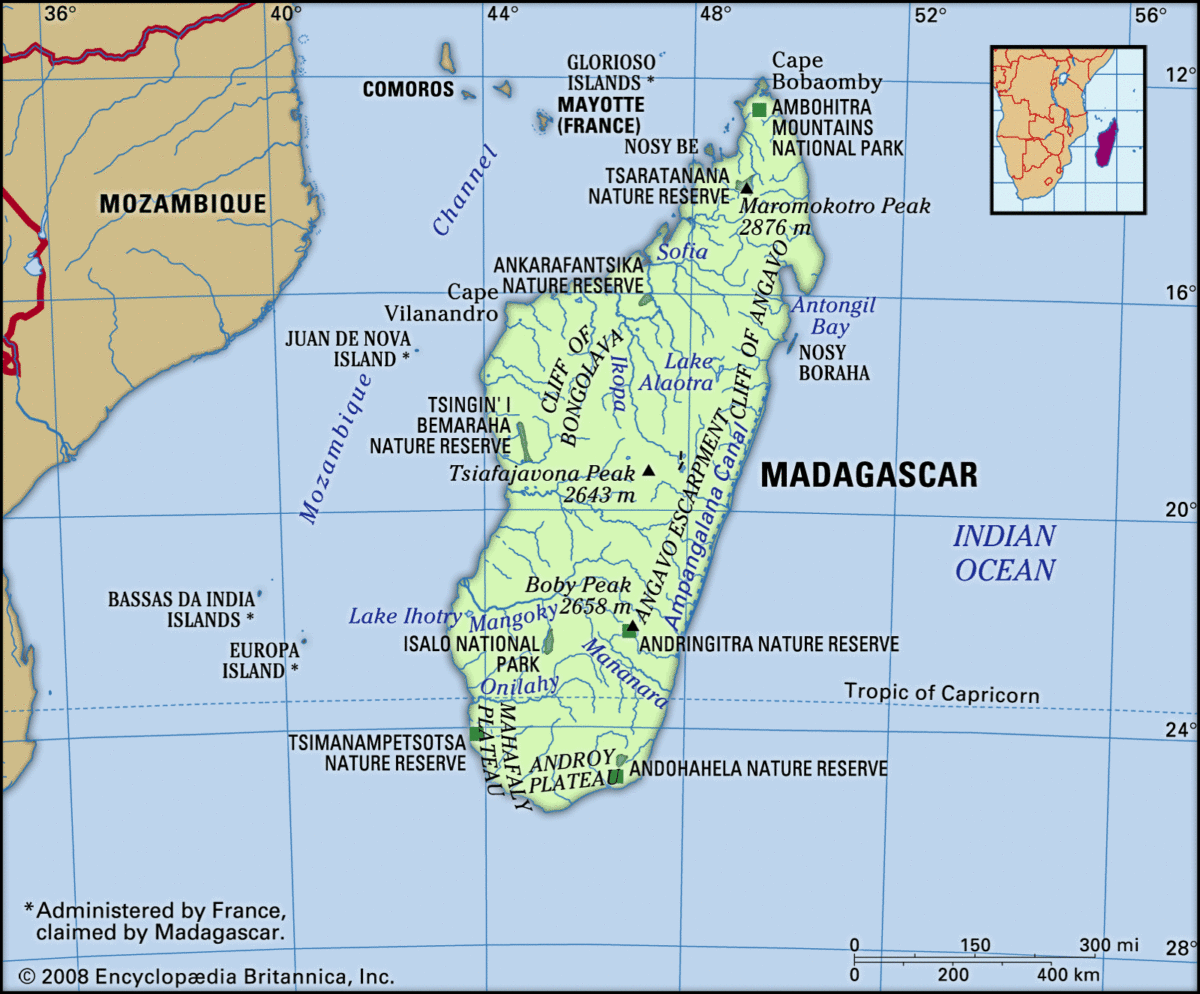 French President Emanuel Macron this month acknowledged that France had been wrong to force the Republic of Haiti to pay an exorbitant indemnity to recognize its independence (scroll down) and had subjected it to the “‘unjust force of history.”‘ During a visit Thursday to Madagascar, Macron said he wanted to work toward “forgiveness” for France’s colonization of the Indian Ocean island. “Macron highlighted the planned return of various cultural items taken from the island by its French occupiers, including the skull of a king decapitated in 1897 by French troops and taken to France as a trophy,” Le Monde and Agence France-Presse reported. “Macron called for a collaboration between historians from both countries so that ‘truth, memory, history and reconciliation can see the light of day.’ The proposal is modeled on historian commissions set up with other territories colonised by France, such as Cameroon, Algeria, Senegal and Haiti.” (Map credit: Encyclopedia Brittanica)
French President Emanuel Macron this month acknowledged that France had been wrong to force the Republic of Haiti to pay an exorbitant indemnity to recognize its independence (scroll down) and had subjected it to the “‘unjust force of history.”‘ During a visit Thursday to Madagascar, Macron said he wanted to work toward “forgiveness” for France’s colonization of the Indian Ocean island. “Macron highlighted the planned return of various cultural items taken from the island by its French occupiers, including the skull of a king decapitated in 1897 by French troops and taken to France as a trophy,” Le Monde and Agence France-Presse reported. “Macron called for a collaboration between historians from both countries so that ‘truth, memory, history and reconciliation can see the light of day.’ The proposal is modeled on historian commissions set up with other territories colonised by France, such as Cameroon, Algeria, Senegal and Haiti.” (Map credit: Encyclopedia Brittanica)
- A survey in the United Kingdom by the Munich-based Worlds of Journalism project found that “UK journalists were overwhelmingly White (90%), university educated (91%), non-religious (71%), and from a privileged background (as defined by their parents’ occupation) (71%),” and that “Female and ethnic minority journalists differed significantly from their male and White colleagues in terms of age and years of work experience. In both groups, journalists over 50 were less numerous, suggesting that female and ethnic minority journalists may experience less job satisfaction than their White and male colleagues.”
 “Cuban artist and political prisoner Luis Manuel Otero Alcántara will auction off some of his work to raise funds to support independent journalists amid one of the worst crises facing the island’s alternative media ecosystem.” CiberCuba reported Wednesday. “The initiative was announced on the Instagram page of the Museum of Dissidence in Cuba, which described the auction as a symbolic act of solidarity in response to the regime’s systematic persecution of independent journalism and the loss of some international aid programs by the United States government. . . .”
“Cuban artist and political prisoner Luis Manuel Otero Alcántara will auction off some of his work to raise funds to support independent journalists amid one of the worst crises facing the island’s alternative media ecosystem.” CiberCuba reported Wednesday. “The initiative was announced on the Instagram page of the Museum of Dissidence in Cuba, which described the auction as a symbolic act of solidarity in response to the regime’s systematic persecution of independent journalism and the loss of some international aid programs by the United States government. . . .”
- “. . . Independent journalist Carlos Michael Morales was summoned again this Monday to the Caibarién Municipal Court, along with his employer, amid a harassment campaign against him carried out by State Security, in complicity with the island’s judicial system,“ Tomás Cardoso reported Tuesday for Marti Noticias. “ ‘They want to silence me in any way they can… They are taking these repressive actions because I continue to practice independent journalism and denounce the Cuban regime’s human rights violations,’ he asserted. “
 In advance of the April 28 elections in Trinidad and Tobago, Reporters Without Borders urged candidates to openly commit to protecting journalists and policies that promote press freedom. “Safety for journalists is trending the wrong way in Trinidad and Tobago. This election is an opportunity for leaders to reaffirm the importance of press freedom and journalist safety, and commit to taking concrete steps to reinforce both. Trinidad and Tobago has historically been a regional leader in press freedom, but the government needs to take action to ensure that journalists – especially women journalists who face heightened threats – are able to do their jobs freely and safely,” the organization said. (Map credit: cuba-diving-smiles.com)
In advance of the April 28 elections in Trinidad and Tobago, Reporters Without Borders urged candidates to openly commit to protecting journalists and policies that promote press freedom. “Safety for journalists is trending the wrong way in Trinidad and Tobago. This election is an opportunity for leaders to reaffirm the importance of press freedom and journalist safety, and commit to taking concrete steps to reinforce both. Trinidad and Tobago has historically been a regional leader in press freedom, but the government needs to take action to ensure that journalists – especially women journalists who face heightened threats – are able to do their jobs freely and safely,” the organization said. (Map credit: cuba-diving-smiles.com)
To subscribe at no cost, please send an email to journal-isms+subscribe@groups.io and say who you are.
Facebook users: “Like” “Richard Prince’s Journal-isms” on Facebook.
Follow Richard Prince on Twitter @princeeditor
Richard Prince’s Journal-isms originates from Washington. It began in print before most of us knew what the internet was, and it would like to be referred to as a “column.” Any views expressed in the column are those of the person or organization quoted and not those of any other entity. Send tips, comments and concerns to Richard Prince at journal-isms+owner@
View previous columns (after Feb. 13, 2016).
View previous columns (before Feb. 13, 2016)
- Diversity’s Greatest Hits, 2018 (Jan. 4, 2019)
- Book Notes: Is Taking a Knee Really All That? (Dec. 20, 2018)
- Book Notes: Challenging ’45’ and Proudly Telling the Story (Dec. 18, 2018)
- Book Notes: Get Down With the Legends! (Dec. 11, 2018)
- Journalist Richard Prince w/Joe Madison (Sirius XM, April 18, 2018) (podcast)
- Richard Prince (journalist) (Wikipedia entry)
- February 2018 Podcast: Richard “Dick” Prince on the need for newsroom diversity (Gabriel Greschler, Student Press Law Center, Feb. 26, 2018)
- An advocate for diversity in the media is still pressing for representation, (Courtland Milloy, Washington Post, Nov. 28, 2017)
- Morgan Global Journalism Review: Journal-isms Journeys On (Aug. 31, 2017)
- Journal-isms’ Richard Prince Wants Your Ideas (FishbowlDC, Feb. 26, 2016)
-
Richard Prince with Charlayne Hunter-Gault, “PBS NewsHour,” “What stagnant diversity means for America’s newsrooms” (Dec. 15, 2015)
- Book Notes: Journalists Follow Their Passions
- Book Notes: Journalists Who Rocked Their World

